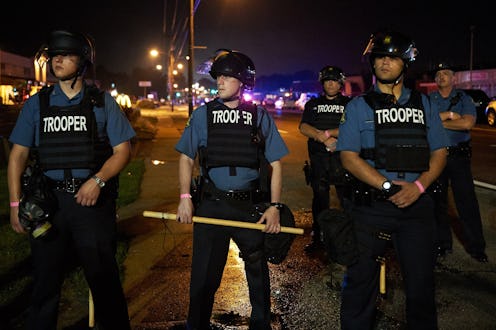News
Why Weren't Ferguson Officers Wearing Body Cams?
No one will know every detail of the events that transpired in Ferguson, Missouri, on Aug. 9, 2014 — no one except Officer Darren Wilson. And the lack of information inspired a national conversation about the need for law enforcers to be accountable to the community members they serve. Police departments across the country adopted the use of body cameras after the death of Michael Brown, but on the shooting's anniversary, Ferguson police still weren't wearing body cameras.
Protesters gathered in the St. Louis suburb to show solidarity with Brown on Sunday. Some of them allegedly threw rocks and bottles at officers, who said that they were fired upon with a stolen handgun. Police injured a man who is in "critical, unstable condition," according to St. Louis County Police Chief Jon Belmar at a Monday morning news conference.
Once again, activists and members of the black community have to live with the fact that they will not have all the facts for another shooting in Ferguson. Again, an officer shot a young man, and the only real source of information is from the police involved. Has the Ferguson Police Department (FPD) learned nothing in the past year?
None of the officers involved was critically injured, and all four have been put on administrative leave, Belmar said. He admitted that none of them wore body cams. The failure in accountability is a huge shortcoming of the FPD. As a highly untrusted police department in America, the FPD made a mistake, one that symbolizes its unwillingness to change and a continual breakdown of community trust.
The Department of Justice (DOJ) released a report on the department in March that revealed a serious lack of training and respect for the community. It read, "It is apparent that FPD requires better training, limits on officer discretion, increased supervision, and more robust accountability systems ... FPD has failed to take any such corrective action, and instead has actively endorsed and encouraged the perpetuation of the practices that have led to such stark disparities."
Even with that scathing report -- which Darren Wilson even admitted to The New Yorker that he didn't read -- the department still didn't adopt the "more robust accountability systems" that the DOJ called for. Officers would presumably expect a date such as the anniversary of the day Wilson shot Brown might lead to violence, so it's even more surprising that they would not take the preemptive measure of wearing cameras.
Kayla Reed, a field organizer with the Organization of Black Struggle, said, "After a year of protest and conversation around police accountability, having plainclothes officers without body cameras and proper identification in the protest setting leaves us with only the officer's account of the incident, which is clearly problematic."
The four officers might have done nothing wrong. They might have followed protocol exactly. But until police departments adopt necessary accountability measures, like body cams, the community will never know.
